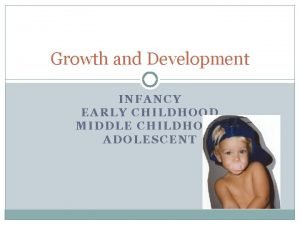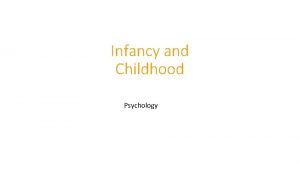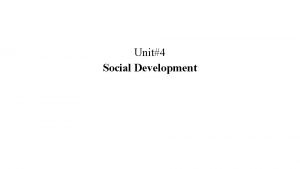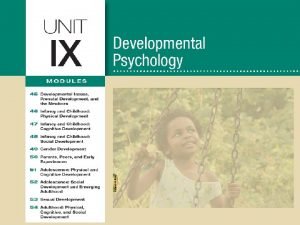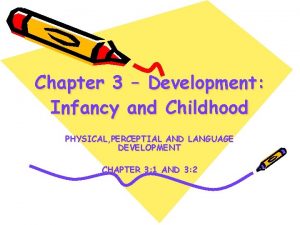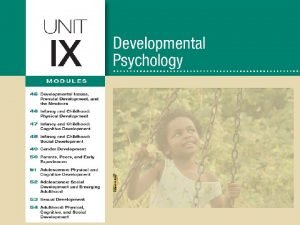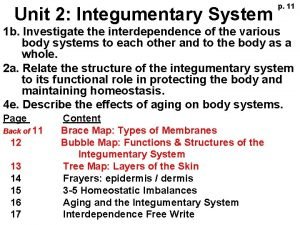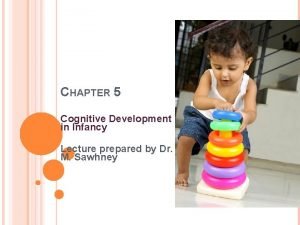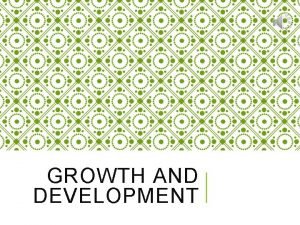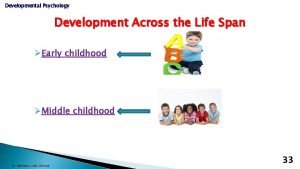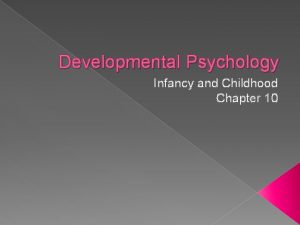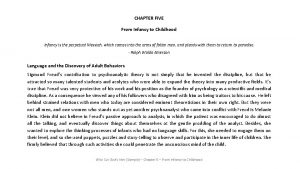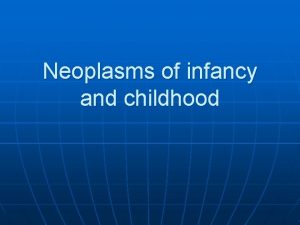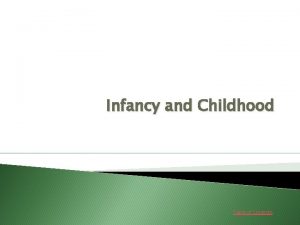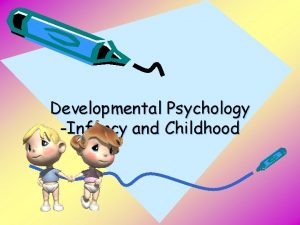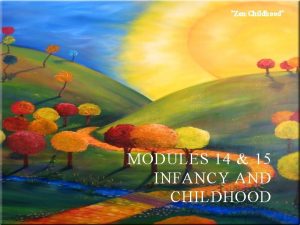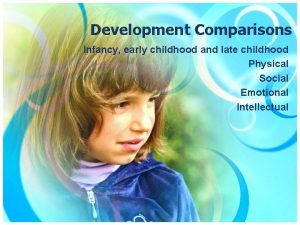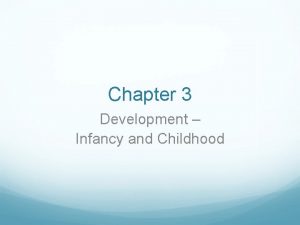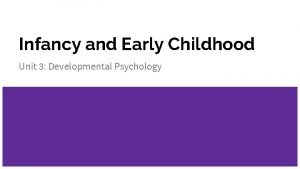PSYCHOLOGY CHAPTER 10 INFANCY AND CHILDHOOD SECTION 1















- Slides: 15

PSYCHOLOGY CHAPTER 10: INFANCY AND CHILDHOOD SECTION 1: THE STUDY OF DEVELOPMENT

• Developmental psychology is the field in which psychologists study how people grow and change throughout the life span- from conception, through infancy, childhood, adolescence, and adulthood, until death.

• Psychologists are interested in studying the two stages discussed in this chapter – infancy and childhood- for many reasons. – One is that early childhood experiences affect people as adolescents and adults.

• Because developmental psychologists study people across the life span, they are interested in seeing how people change over time. • Psychologists use two methods to study change: the longitudinal method and the cross-sectional method.

• Using the longitudinal method, developmental researchers select a group of participants, then observe that same group for a period of time, often years or even decades. – Since the longitudinal method is very time-consuming (and also expensive). Psychologists often use the cross-sectional method instead.

• Using the cross-sectional method, researchers select a sample that includes people of different ages. • They then compare the participants in the different age groups.

THE ROLES OF NATURE AND NURTURE • Psychologists have long debated the extent to which human behavior is determined by heredity (nature) or environment (nurture). • In the field of human development, heredity manifests itself primarily in the process called maturation. Maturation is the automatic and sequential process of development that results from genetic signals. – Example: (Infants usually sit up before they crawl, crawl before they stand, and stand before they walk). – No matter how much one might try to teach these skills to infants, they will not do these things until they are “ready. ”

• The concept of “readiness” relates to an important term in the study of development: critical period. • A critical period is a stage or point in development during which a person or animal is best suited to learn a particular skill or behavior pattern. – Young children seem to learn language more easily than older children and adults.

• Psychologist Arnold Gesell (1880 -1961) believed that maturation played the most important role in development. He focused on many areas of development, including physical and social development.

• Behavioral psychologists, such as John Watson, took a different view from Gesell’s. • This school of thought originated with the 17 th-century English philosopher John Locke, who believed that the mind of the infant is like a tabula rasa (blank slate). • That is, when an infant is born, her or his mind is like a blank slate on which the infant’s experiences will be written. – In this view, “nurture” – or the environment – will have the greatest effect on the newborn’s development.

• Today nearly all psychologists would agree that both nature and nurture play key roles in children’s development.

STAGES VERSUS CONTINUITY • Another topic of debate among psychologists is whether human development occurs primarily in stages or as a continuous process. • Certain aspects of physical development appear to take place in stages.

• Rapid changes usher in dramatically new kinds of behavior, causing entry into the next stage. – When an infant’s legs become strong enough to support him or her, the infant stands and soon begins to walk.

• Once of the most famous stage theorists was Jean Piaget. • His field was cognitive development.

• Not all psychologists agree that development occurs in stages. • J. H. Flavell and his colleagues argue that cognitive development is a gradual process. • Cognitive development is an example of continuous development, which happens slowly and gradually.
 Psychology chapter 10 infancy and childhood
Psychology chapter 10 infancy and childhood Psychology chapter 10 infancy and childhood
Psychology chapter 10 infancy and childhood Chapter 10 infancy and childhood
Chapter 10 infancy and childhood Middle and late childhood
Middle and late childhood Infancy and childhood psychology
Infancy and childhood psychology Social development in infancy
Social development in infancy Ap psych schema
Ap psych schema Infancy and childhood physical development
Infancy and childhood physical development Lesson quiz 3-2 infancy and childhood
Lesson quiz 3-2 infancy and childhood Module 46 infancy and childhood physical development
Module 46 infancy and childhood physical development Module 47 infancy and childhood cognitive development
Module 47 infancy and childhood cognitive development Infancy childhood adolescence adulthood old age
Infancy childhood adolescence adulthood old age Chapter 5 cognitive development in infancy and toddlerhood
Chapter 5 cognitive development in infancy and toddlerhood Social development in late childhood
Social development in late childhood Definition of intellectual in health and social care
Definition of intellectual in health and social care Psychology
Psychology



